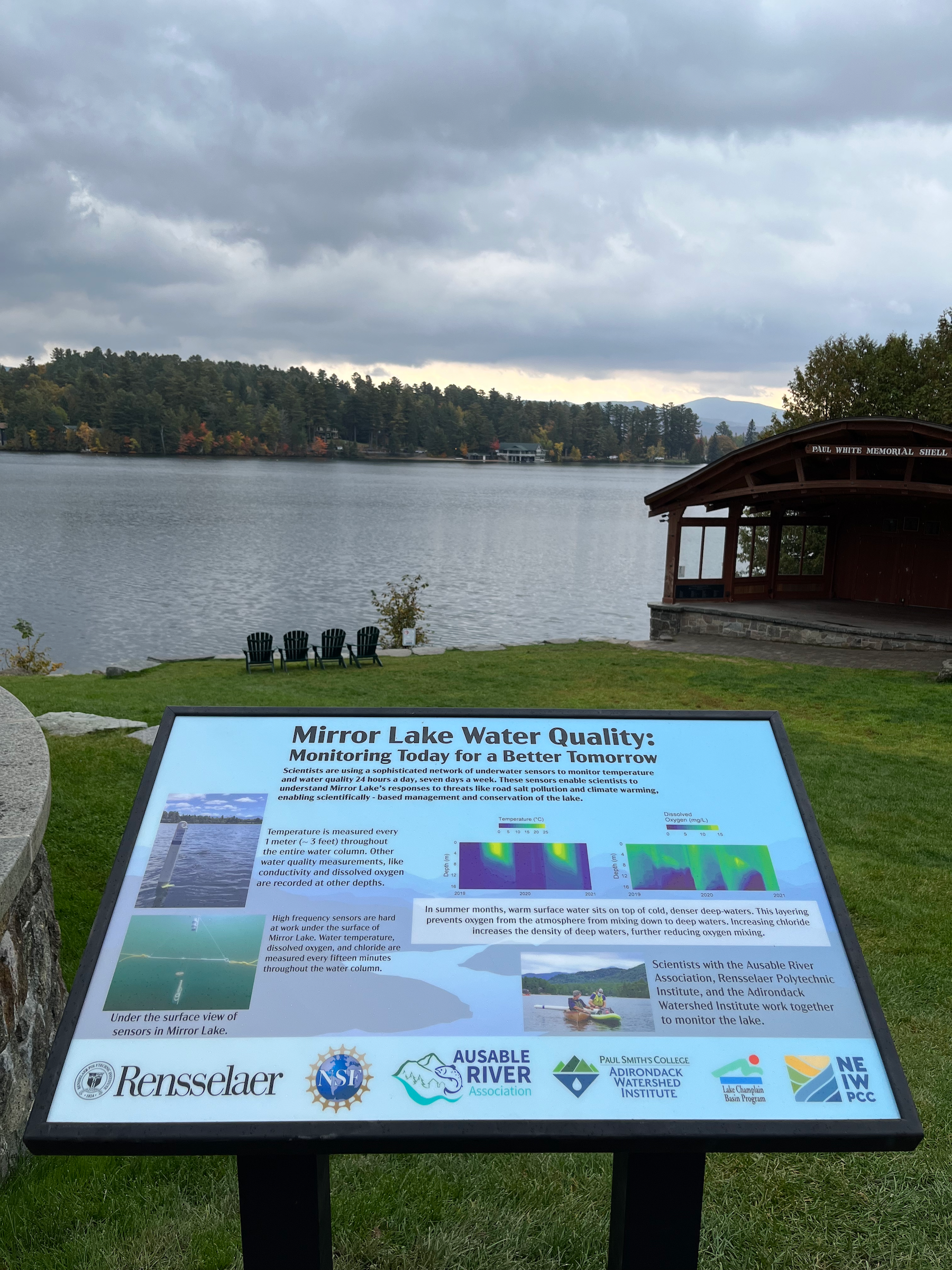
About
Dr. Jonathan Stetler earned his Ph.D. in Biology from Rensselaer Polytechnic Institute where he studied the long-term effects of environmental changes on aquatic ecosystems. Dr. Stetler is currently a Senior Lecturer in the Department of Biological Sciences where he aims to incorporate real-world data sets into the classroom whenever possible. He has extensive experience working with large data sets and recently published a comprehensive long-term limnological data set of over 400 lakes across the world. Dr. Stetler is excited to introduce students to these large data sets in the classroom.
Ph.D. Rensselaer Polytechnic Institute, 2021 - Biology
B.S. Paul Smith's College, 2017 - Fisheries and Wildlife Sciences
Research
Research Interests
I am interested in understanding the effects of environmental changes on freshwater quality. I am creating regional research collaborations across the Northeastern United States to understand the effects of specific environmental changes like global climate change, brownification, and road salt application on freshwater ecosystems.
I use a combination of data-intensive methods in my research including field studies, high-frequency environmental sensors, and ecosystem modeling to understand and predict how ecosystems may change in response to anthropogenic stressors in the future.
I was recently awarded funds from the New York State Parks, Recreation, and Historic Preservation to begin water quality monitoring of nearby Grafton Lakes State Park. This effort will be led by undergraduate students at RPI. Research stipends will be provided to some students for URPs, while more students will use this data in classes at RPI. Please contact me to discuss ways to get involved with the project!
Collaborations
I am also interested in collaborating with small not-for-profit organizations to conduct research and create scientific outreach materials geared towards the general public. I am currently collaborating with science communicators at the Cary Institute of Ecosystem Studies to develop a variety of outreach materials focused on water quality issues.
https://www.caryinstitute.org/news-insights/guide/lake-browning-exploring-ecological-puzzle
I also collaborate with the Ausable River Association to maintain a high-frequency environmental sensor network in Mirror Lake in Lake Placid, New York. I recently completed four interpretative signs around Mirror Lake. Read more here: https://www.ausableriver.org/blog/new-educational-signs-installed-around-mirror-lake

Undergraduate Research Program
I occasionally have opportunities for students to gain research experience and participate in RPI's undergraduate research program for credit. Recent projects have focused on the ponds at Grafton Lakes State Park near campus. Typically, I look for one student in the summer to assist with field work on the ponds. During the fall and spring, I look for students to assist with laboratory work and data analysis. These research experiences culminate in a written report.
A few recent projects:
Samantha Kreamer (Fall 2023). Samantha participated in RPI’s Undergraduate Research Program for credit. Samantha compiled water temperature measurements from three devices across three lakes in the Poconos of Pennsylvania. Samantha characterized consistency of measurements across devices and generated a written scientific reported. Samantha used the R programming Language.
Zainab Alyousef, Sicheng Li, and Zihan Zhang (Fall 2023). These students used data from NEON to investigate various factors of streams. Students used the R programming language and worked with large amounts of data. Zainab documented patterns in stream nutrient concentrations, Sicheng investigated patterns in stream water temperature, and Zihan characterized the stream macroinvertebrate community. Together, these students made connections between their individual factors (abiotic or biotic) and the whole ecosystems they were studying. Research culminated in individual scientific presentations.
Erin Thomas (Summer 2022). Erin participated in RPI’s Undergraduate Research Program for credit. Erin assisted with the monitoring and data analysis of nearby water bodies at Grafton Lakes State Park. Erin published her data in the Environmental Data Initiative. Erin learned skills in environmental field sampling and data analysis. Erin discovered a newfound passion for coding and is hoping to continue computational biology research in the future. https://doi.org/10.6073/pasta/a85f6d3bf8448d5dffe9aa3b99edf995
Please email me to discuss potential projects.
Teaching
Please email me to set up a time. In person and webex meetings are available.
BIOL 1016 - Introduction to Biology Computational Laboratory
The goal of this laboratory course is to learn about biology through computational data analysis. Students will be introduced to a wide variety of real-world biological data sets. Students will learn how to manage, visualize, analyze, and interpret biological data. This class culminates in a collaborative research project. Students enrolled in a major other than biology and students with an interest in computational biology are particularly encouraged to register for this course. Prerequisites/Corequisites: Corequisites: BIOL 1010. When Offered: Fall and Spring terms annually. Credit: 1
BIOL 4200 - Biostatistics
An introduction to the concepts and techniques of modern statistics. Computer-based, in-class sessions will emphasize hands-on application of statistical techniques using data and examples drawn from the biological and medical sciences. Pre-class, online exercises will prepare students for in-depth classroom explorations. Topics covered will include sampling, regression, analysis of variance, and factor analysis, MANOVA, maximum likelihood methods, discriminant analysis, time series analysis, and forecasting. The final project requires analysis of a major research-related data set and write-up of results in the format of a scientific paper. Prerequisites/Corequisites: BIOL 1010, MATH 1010, or permission of the instructor. When Offered: Fall, Spring, and Summer terms annually. Credit Hours: 4
We use Data Camp teaching modules in this course along with in-class coding sessions to teach R programming skills.
BIOL 2961 - Field Experiences in Aquatic Biology
This course provides students with an introduction to the biology and ecology of aquatic habitats found in upstate New York, with a focus on field sampling techniques and data analysis. Topics covered may include lakes, rivers, wetlands, and other inland water bodies, as well as the unique flora and fauna that inhabit these systems. Rensselaer Polytechnic Institute’s Troy, NY campus is uniquely situated near the Hudson River, an aquatic ecosystem with both urban and rural land use. This location can provide excellent research opportunities for students who are interested in biotic responses to environmental stressors. In this class students will conduct a semester-long research project as individuals or in groups where they will derive a research question, collect and identify flora or fauna, and prepare novel environmental data for publication in a free data repository. Additionally, students will design a poster or oral presentation to be shared with the rest of class and instructors. When Offered: Summer term annually. Credit Hours: 2
Pedagogical Innovations
Stetler, J., Moriarty, M., Lucius, M., Farrell, J., Rose, K. (2025). High-frequency sensor data quality control. Project Eddie (environmental data-driven inquiry and exploration). https://serc.carleton.edu/eddie/teaching_materials/activities/308673.html
Stetler, J. (2022). Using Project EDDIE modules in Introduction To Biology Lab. Project Eddie (environmental data-driven inquiry and exploration). https://serc.carleton.edu/eddie/teaching_materials/community_use/instructor_stories/249890.html
Stetler, J., Evans, C., & Bringley, C. (2018). Literature circles as active learning packets for use in the natural sciences: Transforming traditional supplemental instruction into guided study. Eco Ed Digital Library. https://ecoed.esa.org/index.php?P=FullRecord&ID=605.
Recognition
Rensselaer School of Science Outstanding Teaching Award (2025)
The Outstanding Teaching Award recognizes a faculty or staff member for excellence in classroom instruction and other educational activities during the preceding three year period. The winner demonstrates excellence in classroom instruction, is regarded highly by students for teaching accomplishments, and excels in at least one of the following areas: student mentoring, integrating research into the teaching program, course and curricular innovation, and service in introductory or required courses with large enrollments.
Rensselaer Innovative Pedagogy Fellowship For Faculty (2024)
The call sought out faculty who teach in the Arch summer term to redesign their courses using innovative pedagogical techniques.
Publications
The following is a selection of recent publications in Scopus. Jonathan Stetler has 5 indexed publications in the subjects of Agricultural and Biological Sciences, Medicine, Earth and Planetary Sciences.